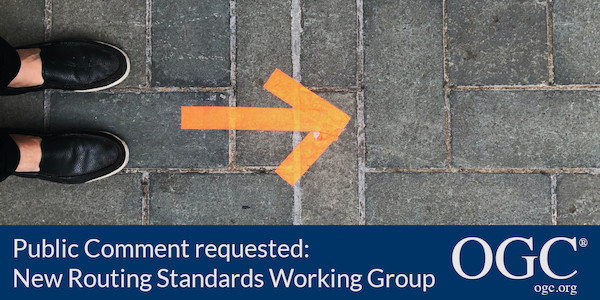New OGC Working Group will develop an API to request, retrieve, and share routes, regardless of the underlying data, routing engine software, and algorithms.

The Open Geospatial Consortium (OGC) seeks public comment on the draft charter for the new OGC Routing Standards Working Group (SWG). The Routing SWG will develop and maintain an OGC API – Routes core standard and extensions, plus a related route exchange model for sharing routes. Comments are due by the 2nd of July, 2020.
Using geospatial information to plan routes for travel and logistics is among the most common uses of geospatial and location-based technologies, with countless routes being generated daily by smartphone users, logistics companies, and others. In support of this, road network data, routing & navigation algorithms, and route calculation services are now available from many different providers and sources. While this diversity in the marketplace is generally beneficial to consumers of route information, it makes accessing, integrating, overlaying, or comparing routes from different routing services overly complex.
The OGC API – Routes will enable a simple method for an application to query any number of routing and/or data providers, even across multiple modes of transport, and present the resulting routes to the user in a single place. The capability for a client to request and retrieve routes from a routing API provider and share routes between applications will improve interoperability for many users, communities, and enterprises.
- For providers of routes, the API and route exchange model will provide a simple model to publish and offer those routes as resources for use by other systems.
- For developers building infrastructures, the API will provide common methods to describe and leverage existing routing engines and algorithms using modern APIs – saving the time and costs associated with developing and deploying custom interfaces.
- For users, applications, and enterprises, the capability to get routes via a common API, regardless of the underlying routing data, engines, or algorithms will provide a significant step forward in geospatial interoperability and modularity.
The proposed OGC API – Routes will provide the methods and apparatus for the execution of basic commands to retrieve, update, share, and delete routes, and will interface with other geospatial resources that use OGC APIs. The proposed route exchange model will provide a method to share routes, regardless of the underlying proprietary data, routing engine software, or algorithms.
Draft specifications for a routing API and route exchange model were successfully demonstrated in the OGC Open Routing API Pilot, the OGC Smart City Interoperability Reference Architecture (SCIRA) Pilot, and other efforts. Coordination with W3C on OGC API – Routes has begun with discussions in the joint W3C/OGC Spatial Data on the Web Interest Group.
The draft charter for the OGC Routing Standards Working Group is available for review and comment on the OGC Portal. Comments are due by the 2nd of July, 2020, and should be submitted via the method outlined on the OGC Routing Standards Working Group Draft Charter public comment request page.
About OGC
The Open Geospatial Consortium (OGC) is an international consortium of more than 500 businesses, government agencies, research organizations, and universities driven to make geospatial (location) information and services FAIR – Findable, Accessible, Interoperable, and Reusable.
OGC's member-driven consensus process creates royalty free, publicly available geospatial standards. Existing at the cutting edge, OGC actively analyzes and anticipates emerging tech trends, and runs an agile, collaborative Research and Development (R&D) lab that builds and tests innovative prototype solutions to members' use cases.
OGC members together form a global forum of experts and communities that use location to connect people with technology and improve decision-making at all levels. OGC is committed to creating a sustainable future for us, our children, and future generations.
Visit ogc.org for more info on our work.
“







